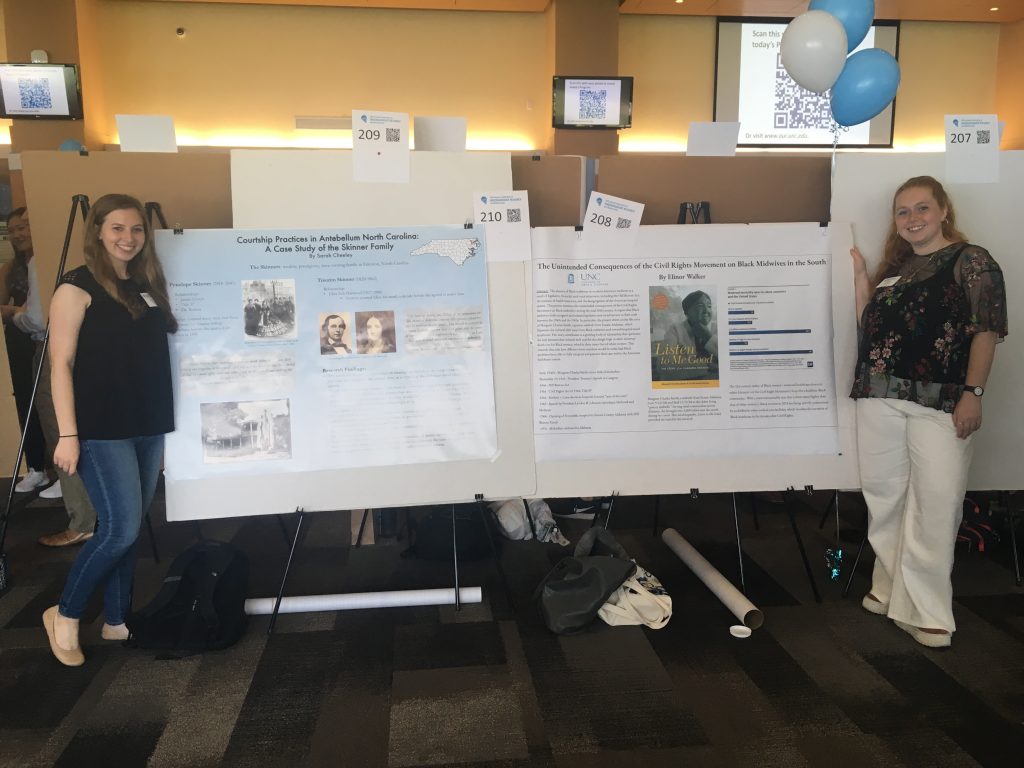
In recent years, the University of North Carolina has encouraged faculty across disciplines to provide new opportunities for undergraduate students to develop research-related skills. Many history courses already include student research, especially the History 398 capstone courses, in which students produce extensive papers based on original work with primary sources. In addition, History Department faculty including Brett Whalen, Ben Waterhouse, and Eren Tasar are providing innovative research opportunities to undergraduates through new courses in a new format.
For Whalen, Waterhouse, and Tasar, these new courses—numbered History 395–were supported by the University’s Quality Enhancement Plan (QEP). Created as part of the 2017 Southern Association of Colleges and Schools Commission on Colleges accreditation process, the QEP funds experiential learning opportunities for undergraduates, including research-related skills courses. The QEP challenges faculty to connect these 1-credit classes to an existing course offering, rather than developing stand-alone courses. This model encourages undergraduate students to go above and beyond the usual course expectations.
Brett Whalen, who serves as Director of Undergraduate Studies, immediately encouraged History faculty to develop research-related skills courses through the QEP, and he also taught one himself. Whalen invited students who took his first-year seminar the previous semester, titled “Time and the Medieval Cosmos,” to take a follow-up class that focused on a detailed analysis of one primary source, Saint Bede the Venerable’s The Ecclesiastical History of the English People.
“I thought this would be a great opportunity because I could draw upon the pool of students that already had some exposure to the subject material about medieval history of science, medieval astronomy, and medieval history, and then¬–this is something you don’t get to do all that often–actually carry on that discussion across two semesters,” Whalen said. “I hadn’t spent that much time ever working on Bede–usually it’s just a week or two. They developed a real sense of Bede that went far beyond the cursory understanding they got in the fall.”
With few limitations placed on them by the QEP, History faculty participating in the program had the freedom to develop their research-related skills courses as they saw fit. While Whalen focused on analyzing historical sources and creating research questions, Ben Waterhouse taught students how to share their research with a broader public. Students in Waterhouse’s class learned how to write an abstract, prepare their paper for submission to a journal, and give a formal research presentation.
Waterhouse invited any student who wrote a 20-30-page research paper in a previous Hist 398 capstone course to apply for his History 395. As a result, student papers focused on topics as diverse as British history, slavery in the United States, the Angolan Civil War, and the transatlantic slave trade. “I said from the very beginning, I can’t come into this as a subject matter expert,” Waterhouse explained. “They’re doing a great job of learning from each other but also talking about how to make their claims and arguments interesting to a broader group of people.”
Waterhouse believes these research-related skills courses offer new opportunities for not only undergraduate students, but also faculty. “In some ways, I think what it’s allowing is to broaden what we mean by historical research,” Waterhouse said. “In my History 398 course, I’d have a fairly traditional model: go to Wilson Library and crack open some boxes, or maybe there are online sources, or maybe there are oral histories. What we’re doing in the various incarnations of History 395 is expanding what research skills mean for historians.”
In fact, many of the students in Waterhouse’s class presented their work at the Celebration of Undergraduate Research on April 25. Four of his students created posters to highlight the main approaches and findings of their research projects. “Their posters used images and text bubbles,” he recounted, “and in some cases charts and pulled-out quotations from sources, to summarize the arguments, historiographical contribution, and overall significance of their research.” This well-attended, college-wide attend allowed the students to showcase their findings to an interdisciplinary audience.
The QEP can fund only a limited number of History 395 courses, but the Department is committed to supporting opportunities for undergraduate students to gain research-related skills. For example, graduate student Till Knobloch taught a section of History 395 called “The Rise of the Third Reich,” which was funded by the Department. Knobloch asked students to read and analyze sources about the rise of fascism in Germany. In Fall 2019, Professor William Sturkey will teach a research-related skills class called “Race & Memory at UNC,” which asks students to use primary documents to explore the history of their own university.
“[Dr. Sturkey’s class] is really about memory and commemoration, and using history as a way to have fruitful, present-moment debates, so it plays directly off of the last couple of years of events on campus. It’s another research skill,” Waterhouse explained.
– Aubrey Lauersdorf
